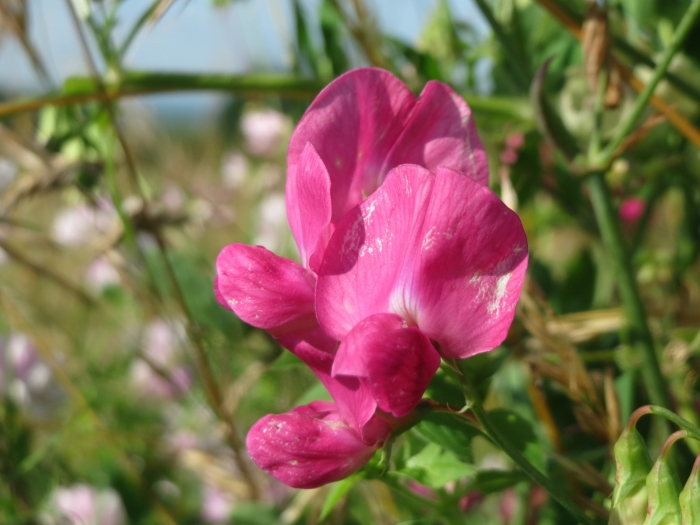Tuberous Pea
(Lathyrus tuberosus)
Tuberous Pea (Lathyrus tuberosus)
/
/

Andreas Rockstein
CC BY-SA 4.0
Image By:
Andreas Rockstein
Recorded By:
Copyright:
CC BY-SA 4.0
Copyright Notice:
Photo by: Andreas Rockstein | License Type: CC BY-SA 4.0 | License URL: http://creativecommons.org/licenses/by-sa/4.0/ | Rights Holder: Andreas Rockstein | Publisher: iNaturalist | Date Created: 2016-06-27T08:47:46-07:00 |





















Estimated Native Range
Summary
Lathyrus tuberosus, commonly known as tuberous pea or earthnut pea, is a climbing perennial herb native to a range of habitats across Europe and western Asia, including rough grassy areas, woodland edges, and banks. It is particularly associated with calcareous soils, which are typically chalky or limestone-rich, and it thrives in loamy soils that provide adequate drainage. The plant can reach up to 4 feet in height and is characterized by its pinnate leaves and clusters of attractive pinkish-red flowers that bloom in the summer, offering a modest yet charming display.
The tuberous pea is valued for its edible, nutrient-rich tubers, which have a long history of use in traditional European cuisine. In cultivation, it is often grown for its ornamental flowers and as a curiosity for its edible underground parts. It is suitable for border planting, cottage gardens, and naturalized areas. The plant prefers full sun to partial shade and requires moderate watering, making it relatively easy to maintain. While not commonly found in commercial nurseries, it can be propagated by seed or division of tubers. Gardeners should be aware that, like other Lathyrus species, it can be susceptible to powdery mildew and other fungal diseases. Additionally, the seeds and foliage contain a neurotoxin and should not be consumed.CC BY-SA 4.0
The tuberous pea is valued for its edible, nutrient-rich tubers, which have a long history of use in traditional European cuisine. In cultivation, it is often grown for its ornamental flowers and as a curiosity for its edible underground parts. It is suitable for border planting, cottage gardens, and naturalized areas. The plant prefers full sun to partial shade and requires moderate watering, making it relatively easy to maintain. While not commonly found in commercial nurseries, it can be propagated by seed or division of tubers. Gardeners should be aware that, like other Lathyrus species, it can be susceptible to powdery mildew and other fungal diseases. Additionally, the seeds and foliage contain a neurotoxin and should not be consumed.CC BY-SA 4.0
Plant Description
- Plant Type: Herb, Vine
- Height: 1-3.3 feet
- Width: 1-2 feet
- Growth Rate: Moderate
- Flower Color: Pink
- Flowering Season: Spring, Summer
- Leaf Retention: Deciduous
Growth Requirements
- Sun: Full Sun, Part Shade
- Water: Medium
- Drainage: Fast, Medium
Common Uses
Bee Garden, Edible*Disclaimer: Easyscape's listed plant edibility is for informational use. Always verify the safety and proper identification of any plant before consumption., Low Maintenance, Showy Flowers
Natural Habitat
Native to rough grassy areas, woodland edges, and banks, particularly on calcareous, loamy soils
Other Names
Common Names: Tuberous Pea, Knobby Pea, Earth-Nut Pea, Groundnut Peavine
Scientific Names: , Lathyrus tuberosus, Lathyrus attenuatus, Lathyrus festicus, Lathyrus festivus, Lathyrus tuberculatus, Pisum tuberosum,
GBIF Accepted Name: